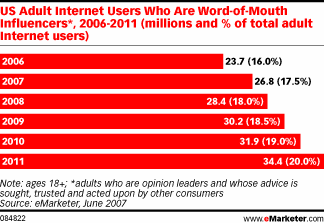Word of mouth marketing, where consumers tell others how much they like or dislike your products and services, is on the rise. In fact, eMarketer reports that 65 million adults in the U.S. are talking about products and services they encounter.
What is significant is that 27 million of them are doing it online via forums, blogs, consumer review sites, social media sites and the like. That trend is only going to increase.

The chart shown above projects that in the next 4 years 20% of all Internet users will be telling others online about the products and services they encounter. While this is great news if consumers have good things to say about your company, it can be not so good if they are speaking negative things. This is where reputation management is becoming more of a full time job. Of course if the talk is positive, it is all good. Sit back and reap the benefits. However, if it turns sour, what is a company to do?
Make It Right
The first step of course would be to make an effort to right the wrong. Sure the larger company you become, the bigger target you become for negativity. But, what about the legitimate concerns? What about situations where the consumer was wronged or had a less than positive experience with a company’s products or services?
For example, I had a horrible experience with a local body shop last year in which they did a very poor job repairing my son’s 1968 Mustang after he had been in an accident. When attempts to get them to fix it correctly failed, what was I to do? What else – blog about it. Being careful not to commit liable and slander, I used used the experience to not only tell others what a horrible experience I had with the body shop but also used it as a lesson of how not to conduct business.
Within no time at all, my blog post was ranking number one for their company name. This went on for a few months. Furthermore, my server stats revealed that people were actually searching for them and arriving at my site.
Several months after the fact the body shop discovered my post and immediately wanted to remedy the situation. Their first offer was to repair the car correctly. However, my son no longer had the car as he had sold it.
The body shop then asked point blank, “what can we do to make you happy (and get rid of that blog post)?” to which I replied, “refund my deductible.” This is what I had asked for in the beginning but was turned down.
To make a long story short, they ended up refunding my deductible and I removed the post. While I probably will not go back to them for any auto body work in the future, they at least took care of a reputation management nightmare that was caused by one unhappy consumer.
Obviously, if you do things right in the first place, these types of situations will not occur. However, no matter how well you do things you may still make some enemies. As these situations unfold, take the extra step to make everything right before you have an online reputation management problem on your hands.
Get Involved in the Conversation
With the advent of blogs and social media, the act of consumers talking about products or services online is only going to increase. Companies need not to be afraid of this but rather embrace it and get involved. This first comes by monitoring the conversation. In other words, keep a watchful eye on what others are saying about you.
One of the easiest ways to do this is to set up Google Alerts. With Google Alerts, you can have Google email you when they find any new results related to keywords you designate – such as your company name or even specific brand names that may be associated with products and services you offer.
Another good way to monitor your online reputation is to use a feed reader such as Google Reader or Bloglines and then set up a search of your company name as one of your feeds. In this way, you will be able to learn most anytime another blogger writes about you and/or links to your site.
Monitoring the conversation is the first step. Actually getting involved is the more important action. The common fear most companies have is that by getting involved, they stir up the pot. Sometimes that is true. It therefore requires wisdom to know when to get involved and when not to.
Most often if the negative talk is a simple misunderstanding or involves a situation that you have made right, you should get involved to clear things up. I have seen this happen quite a few times as a forum moderator. A member will begin to bad-mouth a product or service and a representative from the company will come in and clear things up, either clarifying the misunderstanding or making the situation right. They earn credibility for themselves because they got involved in the conversation rather than just ignoring it, hoping it will go away.
Reap or Weep
Word of mouth marketing is here to stay. As business owners, it is up to us whether we will reap the rewards that come when you have happy customers or weep as we learn hard lessons from the power consumers now have in the Internet.









